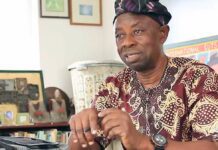
Waliyullah Túndé Abímbọ́lá, the winner of the second edition of the Atelewo Prize for Yoruba Literature, speaks with Literature PADI in this scintillating interview about his writing journey and the challenges writers of Yoruba expression face.
Tell us about yourself.
My name is Waliyullah Túndé Abímbọ́lá. I am a native of Ilobu, a town in Osun State. I studied English at Obafemi Awolowo University, Ile-Ife. I am a Muslim.
How would you describe your childhood? Who were your favorite authors growing up?
My childhood was multifaceted because I spent it in different places. But one thing common to all is that I was not a very boisterous child. The time I saved from not being boisterous, I spent reading.
I liked Amos Tutuola because we had a copy of his My Life in the Bush of Ghosts which I read many times and daydreamt about. I also liked Cyprian Ekwensi because of his small book Gone to Mecca that we had then. Unfortunately, I lost it due to my eagerness to let others experience the book too. I liked Teresa E. Meniru too. She wrote many children books then but I can only remember Softly, Softly and Two Folktales which I, sadly, again, lost due to the same reason as Gone to Mecca. I liked Fẹ́mi Jẹ́bọọ́dà too because of his classic Olówólayémọ̀. I liked him even more when I discovered that he authored the popular Aláwìíyé series. I still like the works of these authors till now.
At what point did you realise you were going to write too?
I don’t think there was such a point. I wrote just as I read, even from Primary school. Starting from hurried scribblings on the blackboard whenever the teacher was out of the class to letters written during English classes that were good so much that the teacher would call me and give me another one to write in front of him because he could not believe I wrote it myself. And so on. But the major undertaking that I can call a beginning for me happened in J.S.S. 3 . Two friends and I decided to write stories that would fill forty-leaves exercise books. One of them brought the exercise books and we spent most of the term writing. The end result was a story I titled Emeka, the Courageous Boy. It is a messy concoction of a story now that I look at it but it was a major achievement for me— for us— then. I still have the book till now.
So, it was then that we told ourselves that we could actually become writers too.
In 2022, Oko Ẹranko, your translation of George Orwell’s Animal Farm won the translation category and the overall prize of the Atelewo Prize for Literature. What sparked your interest in the translation?
Most of the Yorùbá stories I read and was told, as a child, were fables. I reread Animal Farm in 2021 and I thought that it could as well be one of our Yorùbá folktales. So, as I read, I translated it to Yorùbá in my head and it was flowing sensibly. Later, I decided to write the translation, even before I heard anything about the said competition.

Would that be the first time you write or translate to Yoruba?
I had written Yorùbá stories before that. The only other translations I had done before Animal Farm were those of my own works. None of it was published, though.
You studied English Language at OAU. Why write in Yoruba?
About forty percent of the books we had were Yorùbá. So, I read English and Yorùbá together. Also, the Yorùbá that was spoken around was literary too so I always had that potential to write in Yorùbá, even if it was latent in my early years.
Also, studying English at OAU helped boost my regard for Yorùbá language. Our lecturers taught us and we discovered by ourselves too that there was nothing special about English. Any language could achieve the flexibility that English Language has if it is used enough. Yorùbá, and indeed most African Languages, were rich in figurative language in a way that English was not.
The third reason is that when writing in Yorùbá, I can actually see people I know or imaginated stereotypes act out the piece of writing in my mind’s eye, even if it was not drama. Those are the reasons.
What were the challenges you faced while translating Animal Farm?
The major challenge was the constriction of Yorùbá’s vocabulary. I encountered some words that I could not find or immediately formulate a Yorùbá equivalent for. So I pondered on those words . And I enjoyed it. So, it is appropriate to label it “a challenge.” It was not a problem.

How were you able to maintain George Orwell’s voice, style, and political message in Oko Ẹranko?
For voice, I cannot say assuredly that I maintained his voice. The book uses omniscient narration so I don’t think it has a personalised voice as such.
For style, Orwell’s style is quite simple. That was what made it possible for me to attempt it in the first place. It would be hard to try someone like Joyce, for instant, or Soyinka. And the default for Yorùbá prose too is that it is simple. So, I would say I succeeded in that aspect.
For political message, this influenced my choice of words to some extent. I did not want to oversimplify the terms. It was not too hard because the relationships between the animals in our Yorùbá folktales involved some kind of politics or the other. It is mostly someone trying to outwit another or someone trying to solve a difficult situation, especially the tortoise tales. Still, I cannot say that someone who has not read the original would understand one hundred percent the political message Orwell was trying to pass. But this is no big issue since some unsuspecting readers would not detect the political message even in the English original until they are apprised of it.
In your opinion, what is the major challenge of writers whose medium of expression is the Yoruba Language?
Interest. People these days do not read as before. It is not peculiar to Yorùbá alone. I’ll cite an instance. In OAU bookstore, most of the Yorùbá books we met there as new students were still there when we graduated. The only ones that sold were the classics that the people of the past have read and then recommend to people of today.
Some of the modern day writers write (almost) as good as the previous ones. Some don’t. But there’s no way to know if we do not even try them.
So, I would say that the major challenge is not a dearth of works. It is interest. Low sales.
Do you think that the decline in the readership of Yoruba literary texts may lead to the decrease of writers willing to express their arts in the language?
It could. The fate of English writing and Yorùbá writing seems to be converse. English going up and Yorùbá down. There are so many English writing contests these days, even in Nigeria alone. So, writers might be tempted to switch to English which will give their work more exposure. But not all. Some—me, for instance— will continue to write in Yorùbá even if nobody reads it just because of the joy that comes with it.
Can you recommend some Yoruba works, either translated to or originally written in the language, for readers who want to cultivate interest in reading Yoruba?
There is an array to choose from. I have mentioned Olówólayémọ̀ , although I doubt the availablity of that. D.O. Fágúnwà’s adventure series is good too (although it is everybody who seems to have read them.) I recommend Kọ́lá Akínlàdé’s detective stories too, although one may think them too one-way if one reads them all in a rush. Afọlábí Ọlábímtán has some good books too. So do Òkédíji, Fálétí and Akínwùmí Ìṣọ̀lá. I mention authors and not their works because everything by those authors are worth reading. Débọ̀ Awẹ́ and Sunday Ẹ̀ṣọ́ Olúbọ́rọ̀dé have some good works too .
Are there any upcoming projects readers should anticipate from you?
I have upcoming projects, some already written and some still incubating in my head. But they should not be anticipated. There’s no time frame for publishing those works. I’m always on the look out for opportunities. I’m open to creating opportunities for myself too if none appears. But there’s no fixed timeframe for either option, for now.
One last question. Which do you find easier or enjoy better? Writing or translating?
I enjoy writing more, although it is not all that easy. It is bringing into being something that did not exist before. But translating Animal Farm was easy, mostly, because it is giving something that existed before a new form. I add Animal Farm because not all books will be as easy to translate as it was.
Read Also:
- From Fagunwa to Isola: The Translation Narrative of Yoruba Works Continues
- Homage to Lanrewaju Adepoju, the Wordster
 WHATSAPP: Click HERE to join the new Literature PADI WhatsApp group to receive latest updates on your phone and for further literary discussions!
WHATSAPP: Click HERE to join the new Literature PADI WhatsApp group to receive latest updates on your phone and for further literary discussions!








